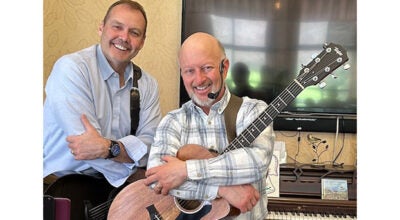Controversy builds in matters of juvenile justice
Published 9:58 am Thursday, March 11, 2010
By JESSICA SIEFF
Niles Daily Star
While he waits to meet with his parents as well as an attorney, Dakotah Eliason’s story is becoming just the latest in a collection of similar stories across the country that are highlighting controversial issues within the juvenile justice system.
Eliason, 14, faces charges of open murder in the shooting death of his grandfather, Jesse Miles. He could possibly face a maximum sentence of life without parole.
Charges came following an automatic waiver imposed by the Berrien County Prosecutor’s Office, a waiver that allows a juvenile to enter into adult court with adult sentences without first going through a judge.
A step some say should be exercised with precaution.
“I think it is appropriate for the executive officer (the prosecutor) to have discretion to waive a juvenile to adult court for certain, specified, serious offenses,” said Stephanie Crino, assistant clinical professor of law at Michigan State University. “However, I also think discretion should be exercised thoughtfully – that is what the public deserves of its elected officials.”
Elected officials brought about a change to state law in the late-1980s to mid-1990s.
Crino said that at the time the public was witnessing a significant amount of crime perpetuated by young offenders, which sparked a fear some might say has led to overall acceptance when it comes to tough laws on minors.
It would be in 1997 that Nathaniel Abraham would become the youngest person ever in the state of Michigan to be charged as an adult. He was 11 when he was arrested for the murder of an 18-year-old man, and 13 when convicted of second-degree murder.
Crino said lowering the eligible age to be tried as an adult has become a bit of a “trend.”
“I think that it kind of happened in the late 80s to early 90s. There were a lot of stories about juveniles killing people in just these atrocious ways and I think the public kind of said that we should be able to punish these kids as adults,” she said. “Overall, it’s been politically popular.”
Popular maybe, but are such laws that see some youth living a life without the possibility of parole in state prison facilities always appropriate?
The question posed to the Supreme Court goes even further. The court is expected to make its decision soon, after arguments were heard in November 2009 on whether a sentence of life without parole for a juvenile is cruel and unusual punishment, a violation of the eighth amendment.
If it’s decided so, Michigan will have some reevaluating to do. According to a report by the independent organization Human Rights Watch in 2008 with an update in October 2009, Michigan ranks second in the country in the number of youths sitting inside its prisons serving life sentences with 346. Pennsylvania ranks first with 444 and Louisiana ranks third with 335.
The American Bar Association stands against the sentence. A member of the ABA, Crino said she agrees.
“I think we need to reevaluate our position on going further and further and further toward treating juveniles as adults,” she said. “I think we tend to think of juveniles in that position as so different from us, as someone we’d never know,” making it easier to take the position of going along with such strong legislative measures.
In the Human Rights Watch report, the organization argues that some of the young criminals don’t always fit the sentences.
“The actual profiles of youth sentenced to juvenile life without parole (JLWOP) show how misguided and unnecessary those decisions were,” it says. “The majority of youth sentenced to life without parole are first offenders. Prior to the crime for which they were sentenced to JLWOP, an estimated 59 percent had neither an adult criminal record nor a juvenile adjudication.”
It is possible Eliason won’t be handed such a sentence, but the issue is one many would like to see examined.
“I think the public needs to reevaluate its position because it needs to change its mind,” Crino said, or public officials won’t change theirs.
“Juvenile sentences can have a far greater treatment component,” she added.
“Furthermore, a court can impose a suspended adult sentence so that, if treatment as a juvenile does not work, or if the juvenile violates the terms of his treatment or probation, the adult sentence automatically kicks in; this makes the suspended adult sentence a pretty safe bet. The juvenile gets a chance at rehabilitation and the public gets protected from dangerous individuals who prove unamendable to treatment.”
For now, the fight to take a second look at how the state handles juvenile offenders continues.
A case of many
According to the complaint and warrant filed by the Berrien County Prosecutor’s Office, Dakotah Eliason sat before police Sunday morning and told them he had “pent up emotions,” apparently retrieved his grandfather’s handgun and allegedly shot him as he lay sleeping on the couch. The case has shocked many in the community. No motive has been given in the incident and Eliason will have his first pre-trial examination, which is scheduled for Tuesday.
The law varies from state to state on just how juveniles are treated within the adult court system but the issue has made headlines here at home and across the country.
* March 8, 1989: Rick Tetzlaff, manager at Vineland Foods in St. Joseph is found dead, shot multiple times, his body discovered at the store. Arrested was Efren Paredes, he was 15 years old. Paredes and his family have maintained his innocence. In 2009 a petition was given to Gov. Granholm in support of his release. Paredes remains incarcerated to this day.
* Nov. 16, 1999: Two years after he was arrested for the murder of an 18-year-old man, Nathaniel Abraham becomes the youngest person in the state to be charged or convicted of murder as an adult. He was 13 at the time of his conviction of second-degree murder.
* Earlier this year in Kent County Michigan: 13-year-old Kieshawn Mann faces open murder charges in the death of his mother’s fiance.






